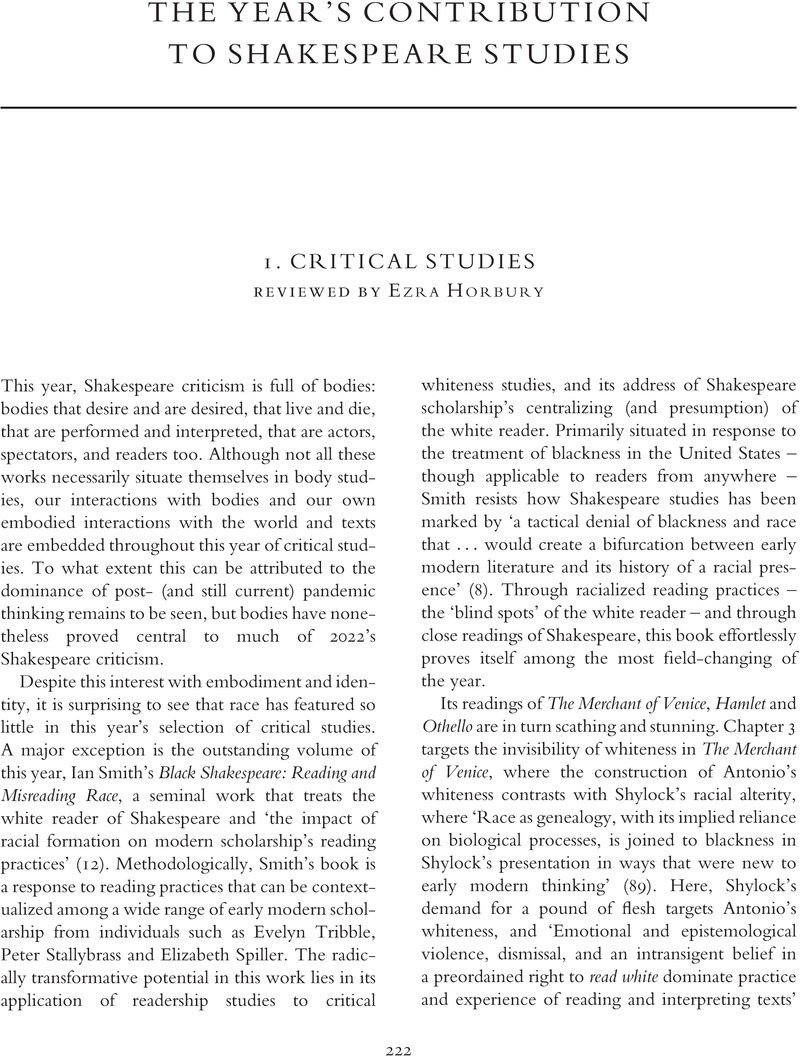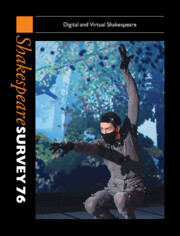Book contents
- Shakespeare Survey 76
- Shakespeare Survey
- Shakespeare Survey
- Copyright page
- Editor’s Note
- Contributors
- Contents
- Illustrations
- All Early Modern Drama Is Virtual to Us
- RSC Live from Stratford-upon-Avon: Ten Things I Think I Know, or, Of Course We’re Making a Movie
- Digital Ariel: An Interview with Mark Quartley
- Staging Digital Co-Presence: Punchdrunk’s Hybrid Sleep No More (2012) And Pandemic-Informed Pedagogies
- ‘Very Tragical Mirth’: Performing A Midsummer Night’s Dream on Screen(s) during Lockdown
- ‘Uneasy Lies the Head’: Michael Almereyda’s Halloween Cymbeline
- When Is King Lear Not King Lear?
- Sim-Ulating Shakespeare: From Stage to Computer Screen
- Metre in the Middle Distance
- ‘What’s in a “Quire”?’ Vicissitudes of the Virtual in Shakespeare’s Julius Caesar and Romeo and Juliet
- ‘And Which the Jew?’: Representations Of Shylock in Meiji Japan (1868–1912)
- Hamlet, Translation and the Linguistic Conditions of Thought
- The Pietas Of Dogberry
- Taylor Mac’s Gary and Queer Failure in Titus Andronicus
- ‘I Would Cure You’: Self-Help Advice on Love in Sidney and Shakespeare
- Shakespeare in Arden: Pragmatic Markers and Parallels
- Sycorax’s Hoop
- Shakespeare Performances in England, 2022
- Peter Kirwan, Productions Outside London
- Professional Shakespeare Productions in the British Isles, January–December 2021
- The Year’s Contribution to Shakespeare Studies
- Abstracts of Articles in Shakespeare Survey 76
- Index
- References
The Year’s Contribution to Shakespeare Studies
Published online by Cambridge University Press: 17 August 2023
- Shakespeare Survey 76
- Shakespeare Survey
- Shakespeare Survey
- Copyright page
- Editor’s Note
- Contributors
- Contents
- Illustrations
- All Early Modern Drama Is Virtual to Us
- RSC Live from Stratford-upon-Avon: Ten Things I Think I Know, or, Of Course We’re Making a Movie
- Digital Ariel: An Interview with Mark Quartley
- Staging Digital Co-Presence: Punchdrunk’s Hybrid Sleep No More (2012) And Pandemic-Informed Pedagogies
- ‘Very Tragical Mirth’: Performing A Midsummer Night’s Dream on Screen(s) during Lockdown
- ‘Uneasy Lies the Head’: Michael Almereyda’s Halloween Cymbeline
- When Is King Lear Not King Lear?
- Sim-Ulating Shakespeare: From Stage to Computer Screen
- Metre in the Middle Distance
- ‘What’s in a “Quire”?’ Vicissitudes of the Virtual in Shakespeare’s Julius Caesar and Romeo and Juliet
- ‘And Which the Jew?’: Representations Of Shylock in Meiji Japan (1868–1912)
- Hamlet, Translation and the Linguistic Conditions of Thought
- The Pietas Of Dogberry
- Taylor Mac’s Gary and Queer Failure in Titus Andronicus
- ‘I Would Cure You’: Self-Help Advice on Love in Sidney and Shakespeare
- Shakespeare in Arden: Pragmatic Markers and Parallels
- Sycorax’s Hoop
- Shakespeare Performances in England, 2022
- Peter Kirwan, Productions Outside London
- Professional Shakespeare Productions in the British Isles, January–December 2021
- The Year’s Contribution to Shakespeare Studies
- Abstracts of Articles in Shakespeare Survey 76
- Index
- References
Summary

- Type
- Chapter
- Information
- Shakespeare Survey 76Digital and Virtual Shakespeare, pp. 222 - 262Publisher: Cambridge University PressPrint publication year: 2023

